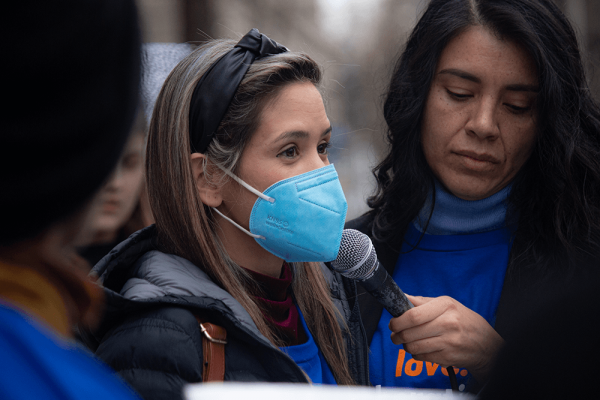Local faith leaders and asylum seekers gathered on Feb. 22 to demand that Washington, D.C., government allow asylum seekers to access resources available to the rest of the district’s unhoused population.
The group called on Mayor Muriel Bowser to revise the Migrant Services and Supports Temporary Amendment Act of 2022, a law that currently prevents migrants from accessing medium and long-term housing. Migrants who cannot produce a form of ID are ineligible to apply for the district’s Health Care Alliance program. Asylum seekers say that lack of access to these services places their communities in unsanitary conditions, at risk of long-term displacement, and without access to vital healthcare services.
“(The government’s) discriminatory decisions are condemning us to cycles of poverty. We want to prosper, not just survive,” said Maryuri, a Venezuelan mother of three whose full name was withheld to protect her privacy. “How can we (survive) if they consider us disposable, temporary, and they deny us the ability to be D.C. residents and apply for identification or health insurance quickly and easily — causing us to have to pay thousands of dollars for not having it? We are being penalized for being poor, and this goes against the definition of sanctuary that this city supposedly claims to be.”
In September, Bowser estimated that 9,000 asylum seekers have arrived to D.C. through busing programs created by the governors of Texas and Arizona. The D.C. Council authorized Bowser to create an Office of Migrant Services and use $10 million to help asylum seekers with immediate needs. But advocates for asylum seekers say that the D.C. government has created a discriminatory social services system that puts especially vulnerable groups in potentially life-threatening situations.
“We were glad to see the city open the Office of Migrant Services,” said Eli Johnson, executive director of the faith-based Congregation Action Network. “However, we are deeply concerned about the provisions in the migrant Services and Support Act that amends the Homeless Services Reform Act by increasing barriers to access and, in fact, singling out migrants for exclusion from homelessness services in the city and asking providers of city services to check people’s immigration status is a huge step backward.”
Congregation Action Network, an interfaith coalition of dozens of congregations in the metro Washington, D.C., area, organized the news conference beside the steps of the John A. Wilson Building to bring migrants’ stories directly to Bowser and the city council.
After the news conference, migrants and their advocates entered the building to speak directly to council members.
“Migrants should be provided with housing, childcare, and essential supplies that they’re not eligible for currently,” Rev. Sharon Stanley-Rea, a director with Church World Service, told Charnisa Royster, deputy chief of staff for Councilmember Janeese Lewis George.
Stanley-Rea also asked that the conditions in shelters be improved “most immediately.” Migrants and advocates described the conditions in the hotel rooms where many migrants are housed: moldy mattresses, bedbug infestations, and inedible food.
“We’ve been appalled by the conditions that we’ve seen and heard about at the hotels,” Johnson said.
The Office of Migrant Affairs had been operating without a director since its creation in September, but last month Tatiana Laborde, former director with the humanitarian nonprofit SAMU First Response, was placed at the agency’s helm. She is now tasked with coordinating the resettlement process for thousands of asylum seekers.
On Feb. 21, the Biden administration announced plans to make it easier for the federal government to deport those who cross the border illegally to obtain asylum. Typically, U.S. law prevents individuals from being deported if they fear returning to their country due to persecution.
Activists said that one of Laborde’s first actions as director was to visit the hotel where Maryuri and others were being housed to tell them that those of them who had a car would no longer be able to park in the hotel parking lot, and those who did would have their vehicles towed.
Representatives for the DC Department of Human Services could not be reached for comment.
Organizers and migrants continue to wait for more long-term fixes to the Migrant Services and Supports Temporary Amendment Act, as no major legislative solution has been proposed.
Got something to say about what you're reading? We value your feedback!





